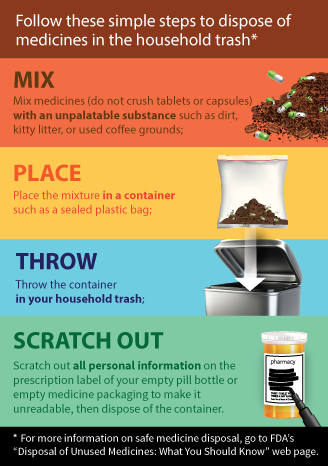Don’t Be Tempted to Use Expired Medicines
Taking expired (out-of-date) drugs carries certain risks
Out with the old! Be it the fresh start of a new year or a spring cleaning, consumers are encouraged to take stock of what has surpassed its usefulness. Medicines are no exception.
In 1979, the U.S. Food and Drug Administration began requiring an expiration date on prescription and over-the counter medicines. The expiration date is a critical part of deciding if the product is safe to use and will work as intended.
The expiration date can be found printed on the label or stamped onto the bottle or carton, sometimes following “EXP.” It is important to know and stick to the expiration date on your medicine. Using expired medicines is risky and possibly harmful to your health.
Expired medicines can be risky
Expired medical products can be less effective or risky due to a change in chemical composition or a decrease in strength. Certain expired medications are at risk of bacterial growth and sub-potent antibiotics can fail to treat infections, leading to more serious illnesses and antibiotic resistance. Once the expiration date has passed there is no guarantee that the medicine will be safe and effective. If your medicine has expired, do not use it.
According to the Drug Enforcement Administration (DEA), many people don’t know how to properly clean out their medicine cabinets. Failing to safely dispose of old medications, especially opioids, all too often leads to dangerous drugs ending up in the wrong hands and can injure children and pets if taken by mistake. The CDC reports that in 2020, there were an estimated 36,564 emergency department visits among children aged 5 years and under for unsupervised medication exposures.
For all these reasons, proper disposal of unneeded medicines is essential.
What to do with expired meds
First, read the medicine’s label and follow any specific disposal instructions that may be included. A drug take-back location, or pre-paid drug mail-back envelope, are the preferred ways to dispose of expired, unwanted, or unused medicine. For example, there are many drug take-back locations in retail, hospital, or clinic pharmacies, and law enforcement facilities. These locations have kiosks or drop boxes where expired medications can be dropped off to be disposed of safely by the facility. Find a location via DEA or Google Maps (mobile-friendly) and type in “drug disposal near me” or “medication disposal near me”. In addition, the National Prescription Drug Take-Back Day, coordinated by the DEA, provides a safe, convenient, and responsible means of disposing of prescription drugs. Find the next date for a Drug Take-Back Day event via the DEA website.
When a drug take-back location or pre-paid drug mail back envelope isn’t available, check if the medication is on the FDA flush list. If it is on the flush list, you may flush it down the toilet. If the medication is not on the flush list, you should follow these instructions to discard the medicine in your trash at home.
A place for everything
Proper storage is one way to help make sure your medicines will remain safe and effective up to their expiration date. Be sure to read the label to see if there are specific storage instructions for your medicine. Certain medicines need to be stored in the refrigerator and others cannot be exposed to high temperatures. Improper storage – such as a damp bathroom cabinet – can contribute to decreased effectiveness in medicines that have not reached their posted expiration date. For most medicines, to help ensure the proper shelf life of your medicine, it is better to store medicine in a cool, dry place such as a dresser drawer, storage box, closet shelf, or kitchen cabinet.
When storing medicine in a kitchen cabinet, make sure that it is away from hot appliances and the sink due to changing temperatures and humidity, which can affect the medicine. Care should be taken to prevent access by children at risk of accidental poisoning or others for whom the medication is not prescribed.
Remember to store medicines properly and don’t use expired medicines – it’s not worth the risk!


